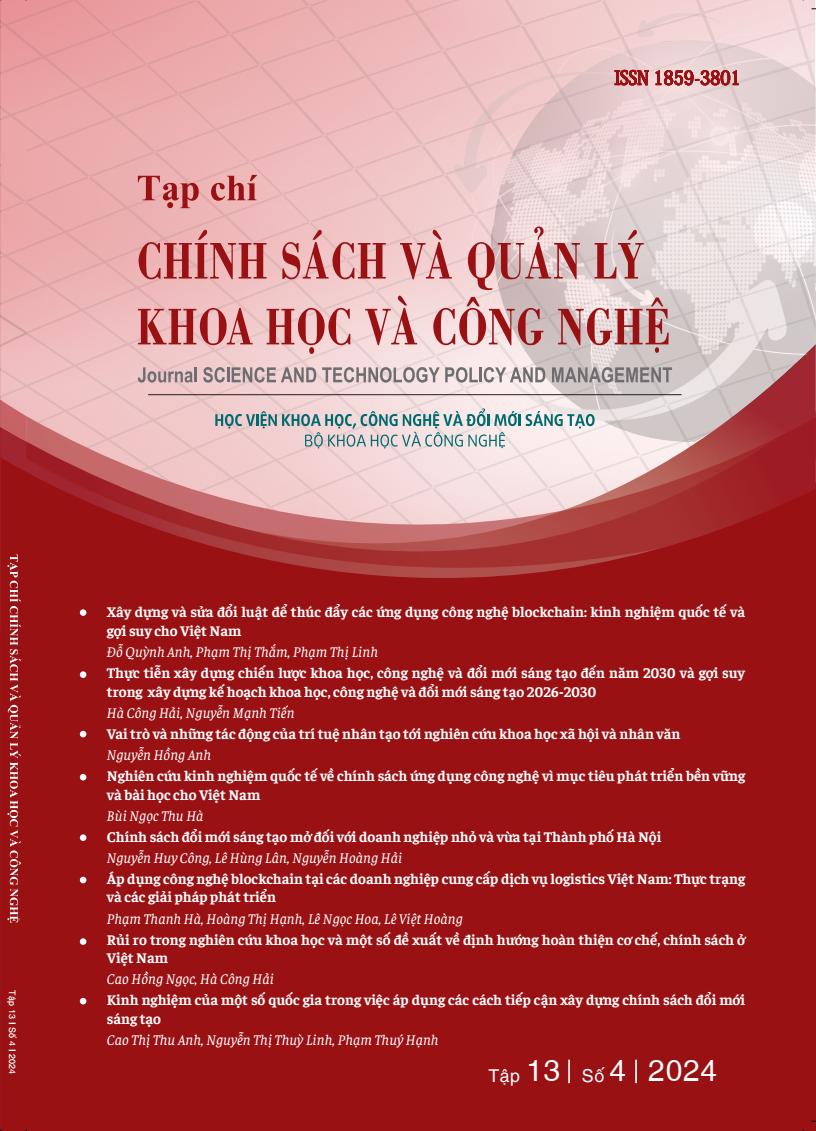Vai trò và những tác động của trí tuệ nhân tạo tới nghiên cứu khoa học xã hội và nhân văn
Từ khóa:
Trí tuệ nhân tạo, Khoa học xã hội nhân văn, Tác độngTóm tắt
Trí tuệ nhân tạo (TTNT) hiện đang phát triển với tốc độ “hàm mũ”, có nhiều đóng góp quan trọng vào sản xuất, kinh doanh, dịch vụ và đời sống con người. Tuy nhiên, trí tuệ nhân tạo là một lĩnh vực rất phức tạp và cũng tạo ra nhiều thách thức rất đáng lo ngại. Hiểu biết đúng về trí tuệ nhân tạo để nắm bắt đúng, kịp thời các cơ hội và thách thức từ trí tuệ nhân tạo là rất cần thiết đối với mỗi con người, mỗi tổ chức và mỗi quốc gia. Trí tuệ nhân tạo có vai trò và có những tác động không nhỏ tới hoạt động nghiên cứu khoa học xã hội và nhân văn. Chúng ta cần có cái nhìn toàn diện hơn để phát huy được những mặt tích cực của TTNT mang lại và giảm bớt những hạn chế mà TTNT có thể gây ra.
Mã số: 24102802
Tải xuống
Tài liệu tham khảo
Cục Thông tin KH&CN quốc gia (2016a). Chuẩn bị cho tương lai của trí tuệ nhân tạo, Tổng luận số 11/2016.
Cục Thông tin KH&CN quốc gia (2016b). Nghiên cứu và phát triển trí tuệ nhân tạo, Tổng luận số 12/2016.
Cục Thông tin KH&CN Quốc gia (2024). Xu hướng hợp tác quốc tế đảm bảo an toàn đối với trí tuệ nhân tạo, <https://www.vista.gov.vn/vi/news/xu-huong-nghien-cuu-cong-nghe/xu-huong-hop-tac-quoc-te-bao-dam-an-toan-doi-voi-tri-tue-nhan-tao-8378.html>
Viện Nghiên cứu sáng chế và Khai thác công nghệ (2021). Công nghệ AI của hiện tại và tương lai,
Vũ Hồng Mai Phương (2024). Dịch văn học trong bối cảnh trí tuệ nhân tạo phát triển
Nguyễn Lương Sỹ (2018), Quyền tác giả đối với tác phẩm hình thành từ trí tuệ nhân tạo, Trường đại học Huế
Hồ Đắc Lộc, Huỳnh Châu Duy (2020). Phát triển trí tuệ nhân tạo tại Việt Nam: thực trạng và giải pháp, Đại học Công nghệ TP Hồ Chí Minh
Trương Khánh Hợp, Nguyễn Tất Hưng (2019). Áp dụng AI vào tâm lý học sẽ tạo ra những lợi ích gì, <https://ictvietnam.vn/ap-dung-ai-vao-tam-ly-hoc-se-tao-ra-nhung-loi-ich-gi-39561.html>
Nam An (2023). Trí tuệ nhân tạo “đặt chân” vào thế giới ngôn ngữ tiếng Việt, <https://chuyendoiso.hochiminhcity.gov.vn/-/tri-tue-nhan-tao-at-chan-vao-the-gioi-ngon-ngu-tieng-viet>
Tiến Dũng (2024). Hàn Quốc sẵn sàng hợp tác với Việt Nam về bán dẫn trí tuệ nhân tạo, https://vneconomy.vn/han-quoc-san-sang-hop-tac-voi-viet-nam-ve-ban-dan-tri-tue-nhan-tao.htm
Alla Tiunova, Felipe Muñoz (2023). ChatGPT: Using AI in Social Studies Academic Research
Alexandre Gefen, Léa Saint-Raymond, Tommaso Venturini (2020), AI for Digital Humanities and Computational Social Sciences
Christopher A. Bail (2023). Can Generativ A Improve Social Science
Drucker, Johanna (September 2013). ”Intro to Digital Humanities: Introduction”. UCLA Center for Digital Humanities. Archived from the original on 29 September 2014. Retrieved 26 December 2016
Dr. Priya Raman (2023). The Transformative Role of AI in Social Science Research
Muhamad Farooq, Hafsa Qadir Buzdar, Saeed Muhammad (2023). “AI-Enhanced Social Sciences: A Systematic Literature Review and Bibliographic”, Analysis of Web of Science Published Research Papers.
Tredinnick, L. (2017). Artificial Intelligence and professional roles, Business Information Review
https://aws.amazon.com/vi/what-is/artificial-intelligence/
http://eadh.org/father-roberto-busa-1.
https://www.opendatasoft.com/en/glossary/artificial-intelligence-ai/
https://www.linkedin.com/pulse/narrow-ai-vs-general-super-ahmed-banafa
Tải xuống
Đã Xuất bản
Cách trích dẫn
Số
Chuyên mục
Giấy phép
Các bài viết (bao gồm cả phần Tóm tắt) ....

